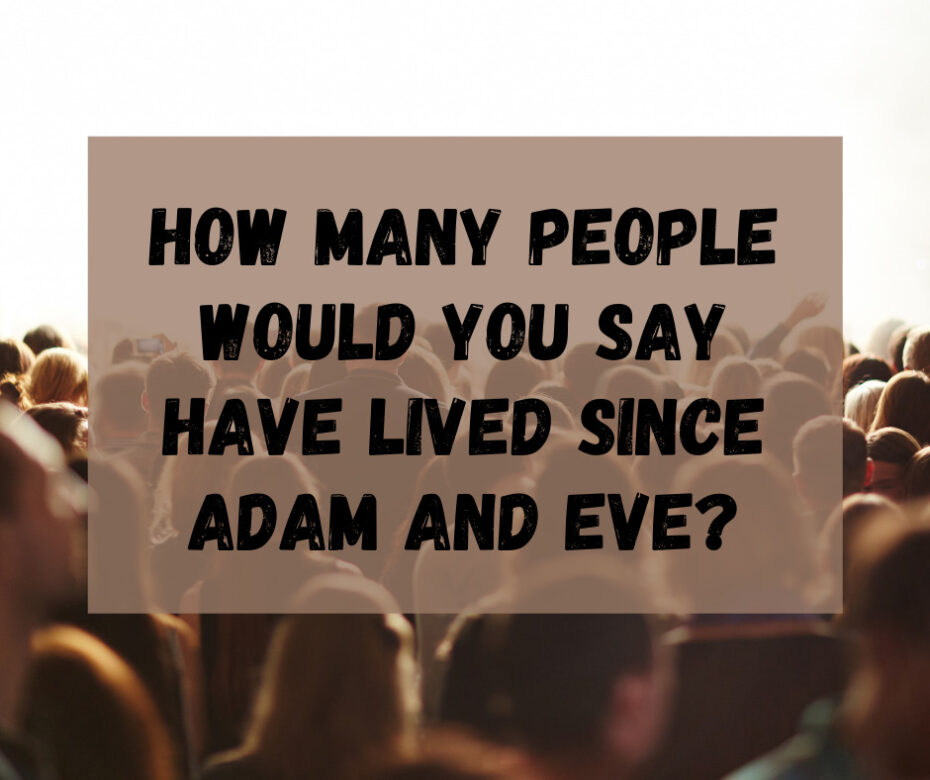I was surprised when I read in DTS Magazine (Summer 2021) that “Over 100 billion people have lived upon the earth…” (p. 9). I know that among young earth creationists (YECs), they hold to a much smaller number.
I found a National Library of Medicine (NLM) article (see here) that says, “105 billion people have lived on earth, of whom 5.5% are alive today.” How do they arrive at that number?
They suggest that “humans have been on earth” since “modern Homo sapiens appeared about 50,000 BC.” Surprisingly, they suggest that “Life expectancy at birth averaged 10 years for most of human history.”
The world population was 7.674 billion in 2019.
The NLM article does not say how many people they think were on earth prior to AD 1, when they say that the world’s population was 300 million. Therefore, the fact that they start at 50,000 BC, instead of around 4,200 BC, does not skew the data more than a billion or so. (They say that in 8,000 BC, the world’s population had only grown to 5 million.)
The fact that they do not account for a worldwide flood and the world’s population starting again with just eight people would seem to skew their data somewhat.
I could not follow the math or the logic in the article. If there were 300 million people on earth around the birth of Christ, and if that number only grew to 500 million by AD 1650, which is what the NLM article suggests, then I find it hard to follow.
Assuming a life expectancy of just 40 from the time of Christ to 1650, then we could expect approximately 400 million people every 40 years during that time period. There were 41 generations of 40 years in that 1650 years. 41 times 400 million equals 16.4 billion people from the time of Christ to 1650.
The world’s population grew to around 1 billion in AD 1800 according to the article.
If we assume that the life expectancy from 1650 to date averaged 60 years, then we could divide the number of years, 371, by 60, to come up with 6.1 generations since 1650. Population estimates indicate around 600 million in 1710, 800 million in 1760, 1.1 billion in 1820, 1.4 billion in 1880, 2.4 billion in 1940, and 6 billion in 2000. Adding all that up, we come up with about 12.3 billion additional people between 1650 and 2000.
In the 21 years since then we have added approximately 140 million births per year or 2.9 billion.
From the time of Christ to today, then, there have been approximately 16.4 billion (1 AD to 1650), plus 12.3 billion (1650 to 2000), plus 2.9 billion (2000 to 2021). That totals 31.6 billion.
Let’s assume a YEC view, since that is my view. And let’s assume that most people born before the Flood were still alive at the time of the Flood since prior to the Flood the life expectancy was around 900.
Answers in Genesis suggests that the population was around “four billion at [the time of] the flood” (see here). So, let’s assume 4 billion people from Adam until the Noahic Flood. According to YEC (and the OT), the Flood occurred around 2,500 BC. This brings the total to 35.6 billion, counting everyone except those between 2,500 BC and 1 AD.
Assuming the estimate of 300 million in 1 AD is correct, and assuming that God greatly blessed the offspring of Noah so that the world’s population grew quickly, we can estimate that during those 2,400 years from the Flood to the manger in Bethlehem the life expectancy was 40 and the average number of people per generation is 50 million, then we could add another 3 billion (60 generations times 50 million per).
That brings the total number of people to 38.6 billion.
Frankly, I had no idea that the number could be that high. I thought it was about half that.
BTW, Answers in Genesis has a nice article that says that if the world’s population doubled just every 150 years, if humans had been around since 50,000 BC, then the current world’s population, with 332 doublings, would be one googol, or 10 to the 100th power (see here). That number is higher than the estimate of all of the atoms in the universe. They pointed out that one doubling every 150 years from 2,500 BC, the time of the Flood, to date leads to the current world’s population.
So, my answer is no, 100 billion people have not lived thus far on earth. I think the number is around 35 to 40 billion. Still, that is a huge number.
Why does this matter? I believe it gives us a sense of the scope of humanity. I think many believers assume that the total number of people who lived before us is about equal to the number of people on earth right now, or about 14 billion total. Realizing that the total is 5 to 6 times our current world population gives me a sense of wonder. This means that there are surely over 1 billion people in the third heaven right now, and possibly many billions are there.
Who knows what we will find in terms of the world’s population at the start of the Millennium, counting all the resurrected people and the non-resurrected ones? And who knows how large it will be at the end of the Millennium after a thousand years of people procreating in a time of peace and in a time when disease and death will be very rare? I bet there will be over 100 billion people in natural bodies by the end of the Millennium.


